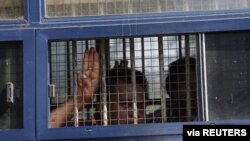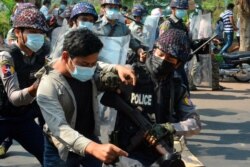Officials attending an emergency session of the U.N. Human Rights Council on the crisis in Myanmar are denouncing the military coup last week that toppled the country's democratically elected government.
The U.N. special rapporteur on the situation of human rights in Myanmar, Tom Andrews, called this a moment of great peril for the people of the Southeast Asian country.
Addressing the U.N. Human Rights Council on Friday, he said the world must unite with the people and not allow what he calls the "illegal and reprehensible" actions of the Myanmar military against its own people to stand.
Andrews said the response of police and security forces to peaceful protests is becoming increasingly violent, and there is growing evidence of Myanmar's security forces using live ammunition against protesters, which violates international law.
Arbitrary detentions and intimidation also are on the rise, he said, adding that the military junta reportedly has detained 220 government officials and members of civil society since the coup. They include the country's de facto leader, Aung San Suu Kyi, and President Win Myint.
"We need more than a statement on a piece of paper," Andrews said. "We need real action from the United Nations … I urge this body, the United Nations and all member states to make at least four core demands of the military junta of Myanmar. That they release unconditionally all who have been detained; that they end the persecution and prosecution of the people of Myanmar for exercising their basic human rights."
Andrews also called on the junta to stand down immediately so the elected government can begin its work. He said there must be an end to impunity, and the military leadership must be held accountable for its actions.
Deputy High Commissioner for Human Rights Nada al-Nashif agreed that this crisis, as well as previous ones, have been born of impunity.
"Long-standing lack of civilian control over the military, its disproportionate influence in the country's political and economic structures, and ongoing failure to genuinely account for crimes committed by the security forces over decades, have combined to compromise Myanmar's democratization and, indeed, its development," al-Nashif said.
However, Myanmar's ambassador to the U.N. in Geneva, Myint Thu, was not swayed by these arguments. He told the Human Rights Council that his government was compelled to take action following election irregularities, adding that this was done in accordance with the state's constitution.
Myanmar is undergoing an extremely complex and delicate democratic transition, the ambassador said. He added that the government is looking forward to a better understanding of the country's situation, and to constructive engagement from the international community.





